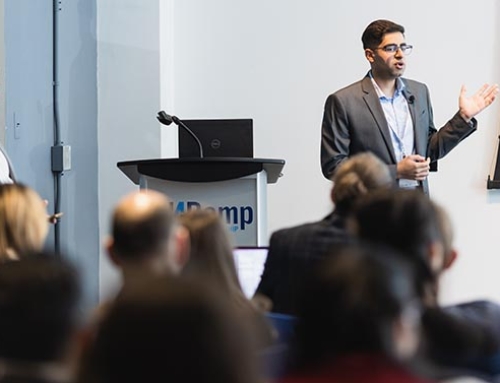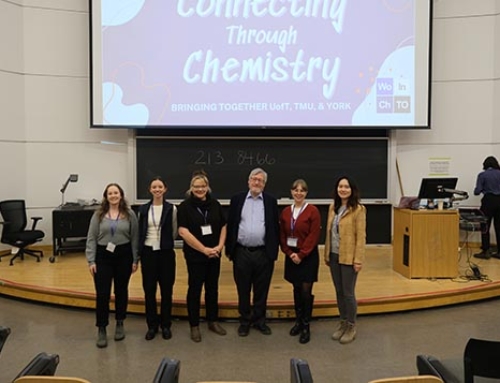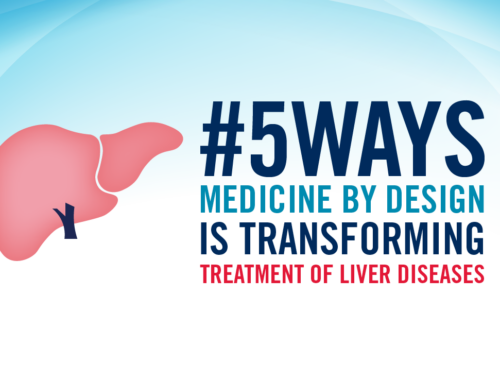
Summer by Design participants are joined by Medicine by Design and CCRM staff members at the 2019 program. Gillian Murphy (third from right) is a PhD candidate from Ireland who participated in the 2019 program alongside other Canadian and international PhD students and post-doctoral fellows.
When Gillian Murphy, a PhD candidate in biomedical engineering at CÚRAM, University of Galway in Ireland, heard about Summer by Design in 2019, she was motivated to apply for that year’s program.
“I’ve always been very curious about how early-stage researchers could translate their innovations toward the clinic,” Murphy says.
After she was accepted, Murphy visited Canada for the first time for the two-week program on the business of regenerative medicine. Summer by Design is held at the University of Toronto (U of T). Applications are currently being accepted for the 2023 program and are due by Jan. 23, 2023.
The program, Murphy says, was an enriching experience both for the content of the program and the introduction to the Toronto regenerative medicine community.
“I believe Toronto’s unique ecosystem is what makes the Summer by Design experience so distinctive. It’s set in a true innovation hub, with the University, world class hospitals and research laboratories within walking distance of each other,” Murphy says.
She highlights refining her research pitching skills, working on case studies, and participating in seminars from startup founders and entrepreneurs about their real-world experiences as some of the memorable experiences she had at Summer by Design. She says she returned to Ireland feeling encouraged and motivated.
“It was very validating to think in-depth about translating and commercializing our research and learn so much about the complexities of it. It has helped me as I continue down my chosen career path.”
A unique opportunity for PhD students and post-doctoral fellows
Having a foundation in the business side of regenerative medicine, says Michael Sefton, is essential knowledge for research trainees, which include PhD students and post-doctoral fellows, and can be a catalyst for their careers in the field.
“Individuals who have advanced degrees in regenerative medicine fields take a lot of different paths,” says Sefton. “They may work in the biotechnology industry or government or found startups based on their research. And those that stay in academia are often interested in pursuing business opportunities based on their research. Summer by Design aims to give trainees a foundation that will prepare them for almost any endeavour in regenerative medicine.”
Sefton is scientific director of U of T’s Medicine by Design, a strategic initiative that funds regenerative medicine research at the University and its affiliated hospitals. Medicine by Design is the primary host of Summer by Design, in partnership with CCRM, the Rotman School of Management, and the Stem Cell Network.
Part of Medicine by Design’s mandate is investing in trainees, says Sefton, with the goals of fostering the next generation of talent, helping trainees grow networks of international peers and ensuring trainees have the skills needed to translate promising research so it can one day benefit patients.
Over an eight-day, interactive and immersive program, participants will learn from some of Toronto’s top experts in areas like product conceptualization, intellectual property, biomanufacturing, regulatory affairs and strategic communications.
Participants come to the University of Toronto from around the world
Each Summer by Design cohort is made up of Toronto-based, Canadian and international participants.
In the past, Summer by Design has welcomed students from Australia, Europe and China in addition to participants from across Canada.
“It’s so valuable to bring international peers into this program,” Sefton says. “Not only does it give Toronto-based and other Canadian participants a chance to connect with others outside of their usual networks, it also introduces international trainees to all the exciting initiatives happening here at the University of Toronto and in the Toronto ecosystem.”
Stem Cell Network is sponsoring a limited number of Canadian trainees who are not based in Toronto with travel grants.
Murphy says, beyond the educational component of the program, her visit to Toronto was memorable.
“We all clicked as a group, so there was a lot of laughing along with the learning. We were brought on a city tour of Toronto, a pub evening of bingo and shuffleboard, and a visit to the Art Gallery of Ontario,” says Murphy. “We have stayed connected since then. It was great opportunity to meet a diverse cohort of professionals.”
About Medicine by Design and regenerative medicine
Medicine by Design builds on decades of made-in-Canada excellence in regenerative medicine dating back to the discovery of stem cells in the early 1960s by Toronto researchers James Till and Dr. Ernest McCulloch. Medicine by Design is made possible thanks in part to a $114-million grant from the Canada First Research Excellence Fund.
Regenerative medicine uses stem cells to replace diseased tissues and organs, creating therapies in which cells are the biological product. It can also mean triggering stem cells that are already present in the human body to repair damaged tissues or to modulate immune responses. Increasingly, regenerative medicine researchers are using a stem cell lens to identify critical interactions or defects that prepare the ground for disease, paving the way for new approaches to preventing disease before it starts.





